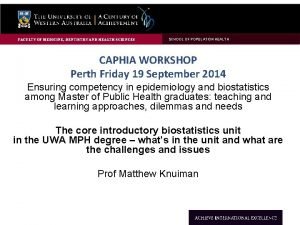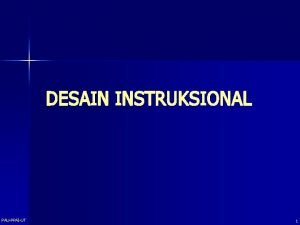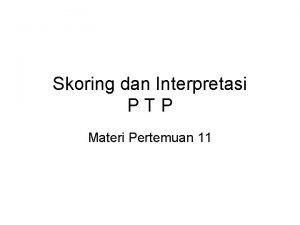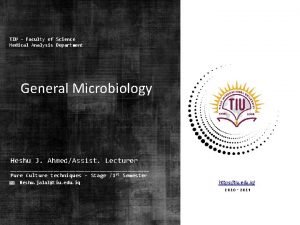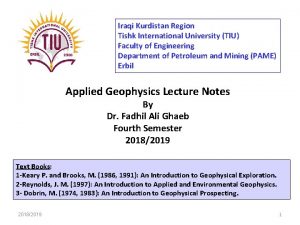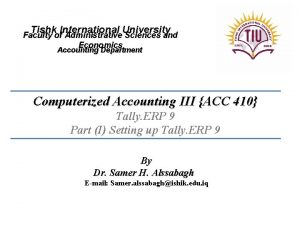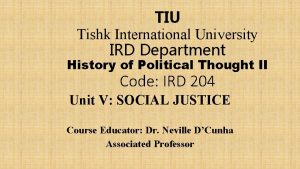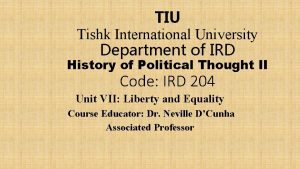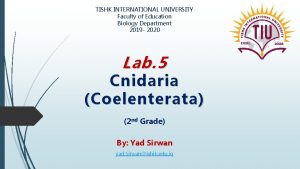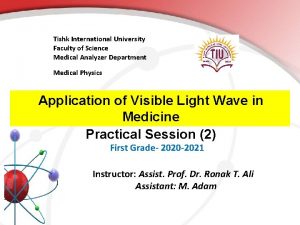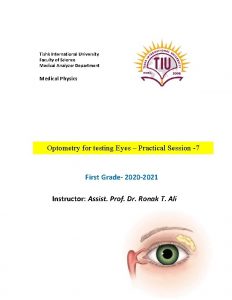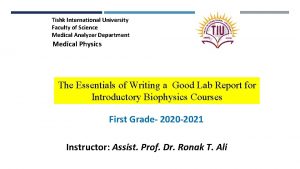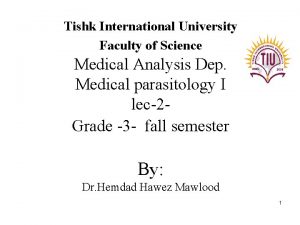TIU Tishk International University Faculty of Admininstrative Sciences



























- Slides: 27

TIU Tishk International University Faculty of Admininstrative Sciences & Economics IRD Department History of Political Thought II Code: IRD 204 Unit II: Democracy – Virtues and Vices Course Educator: Dr. Neville D’Cunha Associated Professor

History of Political Thought II What Kind of Democracy? Virtues and Vices of Democracy • In modern politics there is a strange and perhaps unhealthy silence on the issues of democracy. • So broad is respect for democracy that it has come to be taken for granted; its virtues are seldom questioned and its vices rarely exposed. • In the nineteenth century, when democracy was regarded as a radical, egalitarian and even revolutionary creed, no issue polarized political opinion so dramatically.

What Kind of Democracy? Virtues of Democracy I • Until the nineteenth century, democracy, or at least the right to vote, was usually regarded as a means of protecting the individual against over-mighty government. • Seventeenth-century social contract theorists also saw democracy as a way in which individuals could check government power. • Jeremy Bentham advocated “universal suffrage” in the belief that each individual’s interests were of equal value and that only could be trusted to pursue their own interests.

What Kind of Democracy? Virtues of Democracy II • Other arguments in favor of democracy were more clearly based upon its advantages for the community rather than for the individual. • Democracy can, for instance, create a sense of solidarity by giving all members a stake in the community by virtue of having a voice in the decision-making process. • Hence, democracy can be seen as an egalitarian force standing in opposition to any form of privilege or hierarchy.

What Kind of Democracy? Virtues of Democracy III • Political participation therefore increases the feeling amongst individual citizens that they ‘belong’ to their community. • Democracy represents the community rather than the individual, the collective interest rather than the particular. • Hence, democracy can be seen as an egalitarian force standing in opposition to any form of privilege or hierarchy.

What Kind of Democracy? Vices of Democracy I • The most fundamental argument against democracy is that ordinary members of the public are simply not competent to rule wisely in their own interests. • Whereas Plato (427 -347 BCE) suggested that democracy would deliver bad government, classical elitists, such as Pareto (1848 -1923), Mosca (1857 -1941) and Michels (18761936), argued that it was simply impossible. • Democracy is no more than a foolish delusion because political power is always exercised by a privileged minority, an elite.

What Kind of Democracy? Vices of Democracy II • A further argument against democracy sees it as the enemy of individual liberty. This fear arises out of the fact that ‘the people’ is not a single entity but rather a collection of individuals and groups, possessed of differing opinions and opposing interests. • The ‘democratic solution’ to conflict is a recourse to numbers and the application of majority rule – the rule of the majority, or greatest number, should prevail over the minority. • Individual liberty and minority rights can thus be both crushed in the name of the people. View shared by Alexis de Tocqueville, J. S. Mill and James Madison.

What Kind of Democracy? Vices of Democracy III • Ortega y Gasset (1885 -1955) warned that the arrival of mass democracy had led to the overthrow of civilized society and the moral order, paving the way for authoritarian rulers to come to power by appealing to the basest instincts of the masses. • J. L. Talmon (1952) argued that in the French Revolution influenced by Rousseau’s democratic theories was a ‘totalitarian democracy’ having unrestrained brutality. • The plebiscitary forms of democracy which sought to establish a direct and immediate relationship between the leader and the people through rallies, marches, demonstrations and other forms of political agitation has given rise to fascist states.

TIU Tishk International University Faculty of Admin. Sciences & Economics Dept. IRD History of Political Thought II Code: IRD 204 21 st Century Political Thought HE Educator Dr Neville D’Cunha Professor of IRD

21 st Century Political Thought • Political Theory was in crisis in the 20 th Century. Modern thinking reflected a deep faith in scientific understanding and suggested that propositions that are not empirically verifiable are simply meaningless. • Normative concepts such as ‘liberty, ’ ‘equality, ’ ‘justice’ and ‘rights’ were there discarded as nonsense, and philosophers, as a result, tended to lose interest in moral and political issues.

21 st Century Political Thought • Political scientists turned their backs upon the entire tradition of normative political thought. Terms like ‘democracy’ was redefined in terms of measurable political behavior. • After 1960 s, political theory reemerged with new vitality, and the sharp distinction between political science and political theory began to fade.

21 st Century Political Thought • Thomas Kuhn (1922 -1996) emphasized that scientific knowledge is not absolute but is contingent upon the principles, doctrines and theories that structure the process of enquiry. • John Rawls (1921 -2002) and Robert Nozick (1938 -2002) brought normative and ideological questions back to the forefront of political analysis.

21 st Century Political Thought The ‘traditional’ search for universal values acceptable to everyone has be abandoned. • Some theorists have questioned whether the pressures generated by diversity and pluralism can any longer be confined within liberal framework. •

21 st Century Political Thought Richard Rorty (1931 -2007) questioned the idea of objective truth and has argued that political traditions, like all other belief systems, are merely ‘vocabularies’ that cannot be viewed as more ‘accurate’ than other vocabularies. • John Gray (1951 -) states that political theory is not so much an accumulating body of knowledge, to which major thinkers and traditions have contributed; rather it is a dialogue or conversation in which human beings share their differing viewpoints and understandings with one another. •

21 st Century Political Thought • Politics is, in part, a struggle over the legitimate meaning of terms and concepts. • Language is often used as a political weapon; words are seldom neutral but carry political and ideological baggage. • If a scientific vocabulary of politics is difficult to achieve, the least we can do is to be clear about the words we use and the meanings we assign to

21 st Century Political Thought Concepts are the building blocks of knowledge. • Concepts are sometimes abstract models or ideal-types which only approximate to the reality they help to understand. • • • The can either be descriptive, referring to ‘what is, ’ or normative, expressing views about ‘what ought to be. ’ The meaning of political concepts are often contested; some of them may be ‘essentially contested concepts, ’ meaning that no neutral or settled definition can ever be developed.

21 st Century Political Thought When political analysis uses scientific methods of enquiry it draws a clear distinction between facts and values; seeking to disclose objective and reliable knowledge, it tends to turn away from normative theorizing. • While political theory involves the analytical study of ideas and concepts, both normative and descriptive, political philosophy attempts to refine out understanding of such ideas and concepts in the hope of advancing political wisdom. •

21 st Century Political Thought Political theory confronts a number of problems and challenges in the 21 st Century. • Threatened in the mid-20 th Century by positivism (science), which suggested that the entire tradition of normative political thought is meaningless, political theory revived after the 1960 s, • However, it has subsequently become increasingly diffuse and fragmented, as the status of liberalism has been challenged by the emergence of rival schools. •

TIU Tishk International University Faculty of Admin. Sciences & Economics Dept. IRD History of Political Thought II Code: IRD 204 Liberalism v/s Communitarianism HE Educator Dr Neville D’Cunha Professor of IRD

Liberalism Individualism is a belief in the primacy of the human individual over any social group or collective body. • It is often linked to an egoistical and self-reliant view of human nature, suggesting that society is atomistic, hardly a society at all. • It however, humans are essentially social, individuals will gain fulfillment through the community. •

Communitarianism Collectivism refers to a belief in the community, group or collective, stressing the importance of a common identity and the capacity for collective action. • It is commonly linked to state collectivization and central planning but it can easily refer to selfmanagement and more broadly to social solidarity. •

Liberalism v/s Communitarianism 1. Thomas Hill Green (1836 -1882) • A UK philosopher and social theorist, Green highlighted the limitations of early liberal doctrines. • By drawing upon Kant and Hegel, he highlighted the limitations of the doctrine of ‘negative’ freedom and developed a pioneering defense of ‘positive’ freedom which helped liberalism to reach an accommodation with welfarism and social justice.

Liberalism v/s Communitarianism 2. Isaiah Berlin (1909 -1997) • Berlin developed a form of pluralist liberalism that is based upon the anti-perfectionist belief that conflicts of value are an intrinsic, irremovable element in human life. • Political arrangements should therefore attempt to secure the greatest scope to allow people to pursue their differing ends. • Berlin supported ‘negative’ liberty over ‘positive’ liberty on the grounds that the latter has monistic and authoritarian implications.

Liberalism v/s Communitarianism 3. John Rawls (1921 -2002) • Rawls was the most important liberal philosopher of the second half of the 20 th Century. • His theory of ‘justice as fairness’ not only condemns racial, sexual and religious discrimination, but also rejects many forms of social and economic inequality. • Rawls egalitarian form of liberalism has had a profound effect upon political philosophy generally, and has made a significant contribution to both the modern liberal and social democratic political traditions.

Liberalism v/s Communitarianism 4. Alasdair Mac. Intyre (1929 -) • A Scottish moral philosopher, Mac. Intyre has developed a neoclassical and anti-liberal communitarian philosophy. • In his view, liberalism preaches moral relativism and so is unable to provide a moral basis for social order. • He argues that notions of justice and virtue are specific to particular intellectual traditions, and has developed a model of the good life that is rooted in Aristotle and the thought of St. Augustine.

Liberalism v/s Communitarianism 5. Michael Walzer (1935 -) • A US political theorist, Walzer has developed a form of communalist and pluralist liberalism. • He rejects as misguided the quest for a universal theory of justice, arguing instead for the principle of ‘complex equality, ’ according to which different rules should apply to the distribution of different social goods, thereby establishing separate ‘spheres’ of justice. • He nevertheless evinces sympathy for a form of democratic socialism.

Liberalism v/s Communitarianism 6. Michael Sandel (1953 -) • A US political theorist, Sandel has fiercely individualism, the notion of the ‘unencumbered self. ’ criticized • He argues for conceptions of moral and social life that are firmly embedded in distinctive communities, and emphasizes that individual choice and identity are structured by the ‘moral ties’ of the community. • Sandel has also warned that a lack of embeddedness means that democracy may not long endure, and supports ‘civic republicanism, ’ which he associates with the US political tradition.
 University of kragujevac faculty of technical sciences
University of kragujevac faculty of technical sciences Facultad de ciencias de la salud uma
Facultad de ciencias de la salud uma International university of applied sciences bad honnef
International university of applied sciences bad honnef Mrbs scholarship
Mrbs scholarship Faculty of organizational sciences
Faculty of organizational sciences Pubh4401
Pubh4401 Human sciences vs natural sciences tok
Human sciences vs natural sciences tok Tiu medical analysis
Tiu medical analysis Tik dan tiu
Tik dan tiu Anne laure wu tiu yen
Anne laure wu tiu yen Hilangnya sebagian kromosom karena patah
Hilangnya sebagian kromosom karena patah Interpretasi tiu 5
Interpretasi tiu 5 Lecture note tiu
Lecture note tiu Types of drainage
Types of drainage Batas nilai twk tiu tkp 2021
Batas nilai twk tiu tkp 2021 Streak plate method performed on
Streak plate method performed on C learning tiu
C learning tiu Rmre journal
Rmre journal International journal of rock mechanics and mining sciences
International journal of rock mechanics and mining sciences International council of the aeronautical sciences
International council of the aeronautical sciences Herszon kherson maritime college of merchant marine fleet
Herszon kherson maritime college of merchant marine fleet University of bridgeport computer science
University of bridgeport computer science Bridgeport university computer science
Bridgeport university computer science Hubert kairuki memorial university faculty of medicine
Hubert kairuki memorial university faculty of medicine Solid thyroid nodule
Solid thyroid nodule Applied medical sciences
Applied medical sciences Florida state university ms in cs
Florida state university ms in cs Mendel university faculty of business and economics
Mendel university faculty of business and economics





